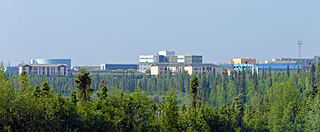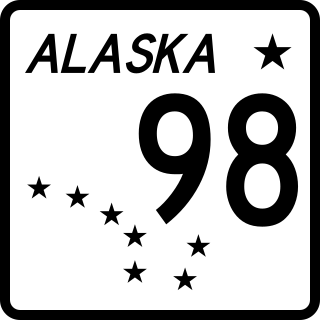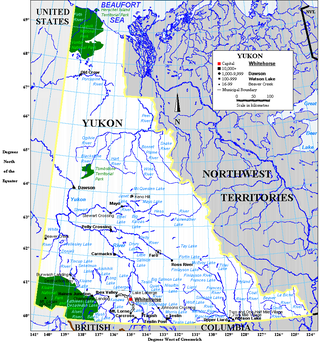Related Research Articles

Yukon is the smallest and westernmost of Canada's three territories. It also is the second-least populated province or territory in Canada, with a population of 44,238 as of March 2023. Whitehorse, the territorial capital, is the largest settlement in any of the three territories.

Inuvik is the only town in the Inuvik Region, and the third largest community in Canada's Northwest Territories. Located in what is sometimes called the Beaufort Delta Region, it serves as its administrative and service centre and is home to federal, territorial, and Indigenous government offices, along with the regional hospital and airport.

The Klondike Highway is a highway that runs from the Alaska Panhandle through the province of British Columbia and the territory of Yukon in Canada, linking the coastal town of Skagway, Alaska, to Dawson City, Yukon. Its route somewhat parallels the route used by prospectors in the 1898 Klondike Gold Rush.

Area code 867 is the area code in the North American Numbering Plan (NANP) for the three Canadian territories, all of which are in Northern Canada. The area code was created on October 21, 1997, by combining regions that were previously served with area code 403 and area code 819 in one numbering plan area (NPA). As the least populated NPA in mainland North America, serving about 100,000 people, it is geographically the largest, at 3,921,739 km2 (1,514,192 sq mi), with Alaska (907) a distant second.
Aurora College, formerly Arctic College, is a college located in the Northwest Territories, Canada with campuses in Inuvik, Fort Smith and Yellowknife. They have learning centres in 23 communities in the NWT. The head office for Aurora College is located in Fort Smith.
Northwestel Inc. is a Canadian telecommunications company that is the incumbent local exchange carrier (ILEC) and long-distance carrier in the territories of Yukon, the Northwest Territories, and Nunavut. Originally established in 1979 by the Canadian National Railway from CN's northern telecommunications assets, it has been owned by BCE Inc. since 1988.

Yukon is in the northwestern corner of Canada and is bordered by Alaska and the Northwest Territories. The sparsely populated territory abounds with natural scenic beauty, with snowmelt lakes and perennial white-capped mountains, including many of Canada's highest mountains. The territory's climate is Arctic in territory north of Old Crow, subarctic in the region, between Whitehorse and Old Crow, and humid continental climate south of Whitehorse and in areas close to the British Columbia border. Most of the territory is boreal forest with tundra being the main vegetation zone only in the extreme north and at high elevations.

CBC North is the Canadian Broadcasting Corporation's radio and television service for the Northwest Territories, Nunavut, and Yukon of Northern Canada as well as Eeyou Istchee and Nunavik in the Nord-du-Québec region of Quebec.
Yukon Energy Corporation is a Crown corporation which is the primary producer of electricity in the Canadian territory of Yukon. It also distributes electricity to a small number of locations not served by the privately-owned ATCO Electric Yukon. YEC was established in 1987 to take over the Yukon assets of the Northern Canada Power Commission and is currently organised as a subsidiary of the Yukon Development Corporation. The company's headquarters is in Whitehorse, Yukon near the Whitehorse Rapids hydroelectric generating station.
ATCO Electric Yukon, formerly Yukon Electrical Company Limited (YECL), is a private electrical utility based in Whitehorse, Yukon, serving most Yukon communities and Lower Post, British Columbia. The company, founded in 1901, is owned by ATCO of Alberta. Through mergers and acquisitions, Yukon Electrical extended to serve most communities in Yukon.
Fort Smith Region was a former Statistics Canada census division, one of two in the Northwest Territories, Canada. It was abolished in the 2011 census, along with the other census division of Inuvik Region, and the land area of the Northwest Territories was divided into new census divisions named Region 1, Region 2, Region 3, Region 4, Region 5, Region 6.

The Northwest Territories is a territory in Northern Canada, specifically in Northwestern Canada between Yukon Territory and Nunavut including part of Victoria Island, Melville Island, and other islands on the western Arctic Archipelago. Originally a much wider territory enclosing most of central and northern Canada, the Northwest Territories was created in 1870 from the Hudson's Bay Company's holdings that were sold to Canada from 1869-1870. In addition, Alberta and Saskatchewan were formed from the territory in 1905. In 1999, it was divided again: the eastern portion became the new territory of Nunavut. Yellowknife stands as its largest city and capital. It has a population of 42,800 and has an area of 532,643 sq mi (1,379,540 km2). The current territory lies west of Nunavut, north of latitude 60° north, and east of Yukon.

The history of Yukon covers the period from the arrival of Paleo-Indians through the Beringia land bridge approximately 20,000 years ago. In the 18th century, Russian explorers began to trade with the First Nations people along the Alaskan coast, and later established trade networks extending into Yukon. By the 19th century, traders from the Hudson's Bay Company were also active in the region. The region was administered as a part of the North-Western Territory until 1870, when the United Kingdom transferred the territory to Canada and it became the North-West Territories.
The Court of Appeal for the Northwest Territories in Canada is the highest appellate court which hears appeals from criminal cases and civil cases of the Supreme Court of the Northwest Territories.
Fred Koe is a former territorial level politician and Member of the Legislative Assembly of the Northwest territories from 1991 to 1995. He was born in Aklavik.
The 2012 NWT/Yukon Scotties Tournament of Hearts, the women's provincial curling championship for the Yukon and Northwest Territories, were originally scheduled for January 26 to 29 at the Yellowknife Curling Club in Yellowknife, Northwest Territories. However, due to no entries into the Yukon Ladies Championship, the Northwest Territories Ladies Championship, held January 13–15, at the Inuvik Curling Club, in Inuvik, was used to determine a representative for the Yukon/Northwest Territories. Kerry Galusha and her team from Yellowknife won the tiebreaker final, and the right to represent Yukon/Northwest Territories, at the 2012 Scotties Tournament of Hearts in Red Deer, Alberta, where Galusha would finish round robin with a 4-7 record.
The 2013 M&M Meat Shops Canadian Junior Curling Championships were held from January 31 to February 10 at the Suncor Community Leisure Centre at MacDonald Island Park and at the Oilsands Curling Club in Fort McMurray, Alberta. Alberta last hosted the junior championships in Calgary in 2011. The winners will represent Canada at the 2013 World Junior Curling Championships in Sochi, Russia.

The Indigenous peoples of Yukon are ethnic groups who, prior to European contact, occupied the former countries now collectively known as Yukon. While most First Nations in the Canadian territory are a part of the wider Dene Nation, there are Tlingit and Métis nations that blend into the wider spectrum of indigeneity across Canada. Traditionally hunter-gatherers, indigenous peoples and their associated nations retain close connections to the land, the rivers and the seasons of their respective countries or homelands. Their histories are recorded and passed down the generations through oral traditions. European contact and invasion brought many changes to the native cultures of Yukon including land loss and non-traditional governance and education. However, indigenous people in Yukon continue to foster their connections with the land in seasonal wage labour such as fishing and trapping. Today, indigenous groups aim to maintain and develop indigenous languages, traditional or culturally-appropriate forms of education, cultures, spiritualities and indigenous rights.
References
- ↑ "Yukon Curling Association > Membership > Yukon Curling Clubs". www.yukoncurling.ca. Retrieved 2019-04-10.